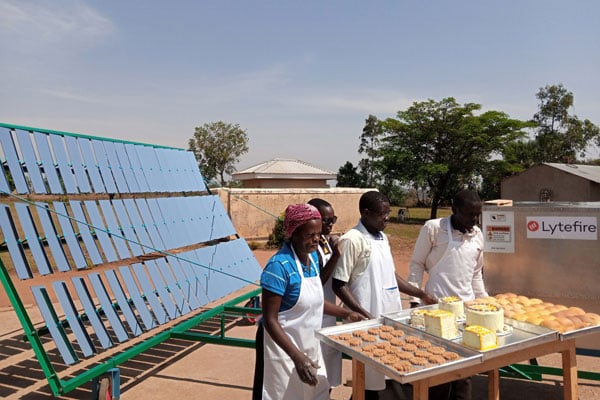Lira youth eke living from baking

Youth display some of the products they make under their Champion’s Bakery at Omono Anyira Gedo Village, Apoka Parish in Ogur Sub-county, Lira District, last month. PHOTOS/BILL OKETCH
What you need to know:
- They had also been incurring a lot of losses in terms of materials such as fuel for production.
More than 400 youth in Ogur Sub-county, Lira District, have started baking cakes to make ends meet.
Under the organisation, Youth for Life Uganda, the group started a bakery they named Champion’s Bakery, located at Omono Anyira Gedo Village, Apoka Parish in Ogur Sub-county, after failing to continue with their studies.
Champion’s Bakery, which started by making mandazi (half cakes) two years ago, has now diversified its products to included cakes and buns, which they sell at between Shs200 and Shs500 each.
They also make groundnut butter cookies, chocolate butter cookies and queen cakes.
Clean energy
When they first started two years ago, the youth were using charcoal and firewood for the production, but they have since turned to solar for clean and sustainable energy.
They are now using the Lytefire solar oven, which is powered by sunlight, built from locally available materials and is cost-efficient on terms of fabrication and maintenance.
The team also conducts training in bakery for other youth in the area.
So far, at least 15 other youth have been trained in how to use and maintain the solar oven. They have also gained skills in hygiene and ingredients handling, and measuring temperature in the oven.
Ms Jolly Akello, a member of Youth for Life Uganda, says: “We just calibrate the machine, put the bread and the products just come out very fine. The cakes are so delicious. I have no doubt this thing will automatically change my life for the better.”
Mr Denis Okwir, the executive director of Youth for Life Uganda, says the charcoal and firewood oven used to consume a lot of fuel.
“We used to buy a full lorry of firewood after every two weeks, which was very expensive and made people cut down trees indiscriminately,” he says.
He adds: “We have seen how a solar-powered oven works, how the sun can generate heat to the maximum of 300°C. This is not a joke, it is a reality that we have seen working,” Mr Okwir adds.
“The youth thought they had already failed in life but with the bakery project, they are sure of earning at least Shs8,000 each per day. It is quite impressive for someone in the village to start earning that amount of money,” Mr Okwir says.
The youth applauded Finnish solar energy company, Solar Fire Concentration Ltd, and Plan International’s I DECIDE programme, for introducing them to clean energy.
The organisations aim at empowering young people by creating sustainable jobs, supporting local productivity and promoting a more creative and innovative economy while reducing deforestation and contributions to climate change.
Mr Allen Wilson Odongo, a solar power trainer for the Ogur hub, says the intervention is timely because the beneficiaries had been making only mandazi.
They had also been incurring a lot of losses in terms of materials such as fuel for production.
“So, we have given them some insights on the procedures to be followed for them to make better mandazi and also to diversify their products,” he says.
Mr Lorin Symington, the chief operations officer for solar fire concentration, says their technology focuses on easy-to-use materials that can be found anywhere in the world.
“The Lytefire oven was built in Kisumu, Kenya and we buy everything locally. And so, if something breaks, a local technician can take care of it, a local welder can take care of it because there is no hi-tech component. It’s all relatively simple welding and glass work,” he says.




